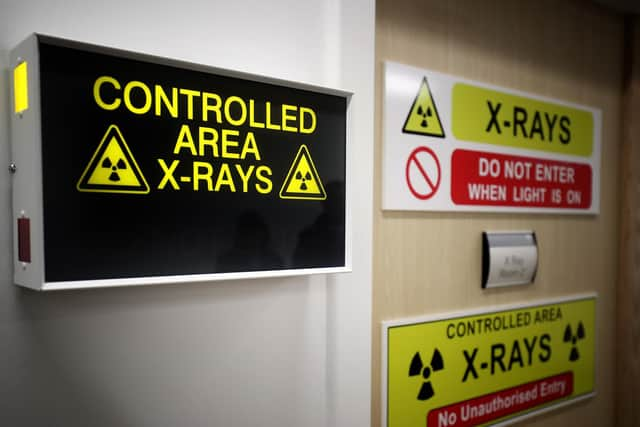People urged to report concerning symptoms after a drop in referrals for cancer scans at Queen Victoria Hospital
and live on Freeview channel 276
A pause on non-urgent treatment, a shortage of radiographers and a reduction in people coming forward for tests are said to have affected scans across England.
Teams at Queen Victoria Hospital NHS Foundation Trust performed more than 1,000 fewer imaging scans between March last year and February in comparison to the same period in 2019-20, NHS figures show.
Advertisement
Hide AdAdvertisement
Hide AdImaging tests that can be used to diagnose or detect cancer were carried out 3,720 times during that time - a 26% drop.


The number of brain MRI scans fell by 46% while there were 39% fewer chest x-rays performed and a drop of 12% in ultrasounds of the pelvis and abdomen.
Across England the number of scans used to diagnose or discount cancer dropped by a quarter to around 8.5m as lockdown measures gripped the health service.
Postponements of non-urgent healthcare throughout spring last year contributed to the steep decline in diagnostic imaging activity levels.
Advertisement
Hide AdAdvertisement
Hide AdBut a reduction in people coming forward for tests has also had an impact, according to an NHS spokesman, while the Royal College of Radiologists say the crisis was exacerbated by a shortage of radiographers that predates the pandemic.
Dr Ian Francis, Imaging Lead and Director of Clinical Strategy at Queen Victoria Hospital, said: “Throughout the pandemic Queen Victoria Hospital has been carrying out life-saving surgery for patients from across Sussex, Surrey and Kent with high-risk cancers.
“Cancer imaging is just one component of our radiology services, all of which ran throughout the pandemic to meet demand. Whilst we have seen fewer referrals for scans during the pandemic, as we are able to see and treat more patients demand for our radiology services will continue to increase.
“We would encourage anyone who has symptoms they are concerned about to visit their GP - the earlier cancer is diagnosed, the sooner it can be treated.”
Advertisement
Hide AdAdvertisement
Hide AdDr William Ramsden from the RCR said waiting lists for hospital treatments across the country were at a record high, with many patients on those lists likely to require scans.
Calling for investment in radiologist training, he added: “The pause in non-elective NHS work during the coronavirus peak last spring had a huge knock-on impact on waits for scans and treatment.
“NHS England has helped increase radiology capacity, coming through with emergency funding for scanners and private provider support, which must continue."
Dr Ramsden said the RCR supported NHS plans to speed up scan access via diagnostic hubs but said thousands more radiologists were needed in order to ensure the changes could be implemented successfully and patients treated, scanned and diagnosed in a timely manner.
Advertisement
Hide AdAdvertisement
Hide AdAn NHS spokesperson praised the tireless efforts of NHS staff and said diagnostic imaging services had continued despite the impact of the pandemic, with 90% of urgent referrals with suspected cancer seen within two weeks in February.
She added: “We know that fewer people have come forward for checks during the pandemic but we continue to urge anyone experiencing worrying symptoms that could be cancer to contact their GP as soon as possible so the NHS can investigate them as soon as possible.”